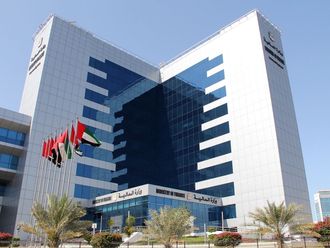
The credit cards salesman from an international bank in the UAE was indeed trying to get to know me better. The form that he had brought along was at least four pages long. After filling in everything from the residential addresses of my two references in my home country, to mobile numbers of the next of kin and details of cards held earlier, I paused at the column requiring the applicant’s mother’s maiden name to ask why the bank would need a name that is not in common use. Could it be a printing error that could lead to complications in case someone called her to verify and she did not say that was her name?
“It does not matter, ma’am. You just fill something,” the sales executive said helpfully and watched as I filled in her married name, which features in all official documents, in the space provided.
Why the bank needed it became clear a year later, when I tried to make an online payment using the credit card. The verification process, online and on-call, required answering the secret question regarding my mother’s maiden name, which I filled in correctly this time. About 20 tries and many frustrating calls later it was clear that it did not match the data on record, which was picked up from the know your consumer (KYC) form I filled a year earlier.
If properly undertaken, KYC becomes a crucial weapon for the anti-money laundering (AML) focus, both locally and globally. According to a paper by financial consulting firm PWC, “Compliance with AML, KYC and sanctions regulatory requirements dominated the financial services landscape in 2013. This looks set to continue in 2014.”
In the UAE, changes in the AML and Combating the Financing of Terrorism Law and the start of Al Etihad Credit Bureau are likely to increase the focus on KYC norms among financial institutions.
Information collected from consumers not only counters financial crime but also aids in creating more user-friendly products. Experts say that though the region may be currently lagging behind in analytics — primarily due to lack of data — an increased emphasis on AML compliance is set to change this.
Credit history
Al Etihad Credit Bureau, which was first announced last year, will have data from everyone with a UAE ID and those part of the active credit population, estimated at almost half of the UAE’s ten million inhabitants.
Vivek Agarwal, Senior Vice President and Business Head for Analytics and Technology Solutions at Dun & Bradstreet (D&B) in emerging markets of Middle East, Africa and South Asia, says: “We have observed that the presence of a credit bureau expands the overall market, benefitting customers as well as banks. With the availability of customer credit history from a bureau, banks can use analytical models to assess customer risk profiles more accurately to move towards risk-based pricing from average pricing, while customers can build reputational collaterals and seek better credit terms.”
At its best, a collaborative approach to data ensures a perfect match between an institution’s products and consumer need. This is done by ensuring that all consumer data that is collected is available in real time across banking platforms, in a central repository before being used for analytics of consumer behaviour.
It may seem like everyone knows what we buy, eat, pay for and like. And the information is all out there somewhere. However, according to a 2014 white paper by loyalty software company TIBCO loyalty labs, 80 per cent of consumer data will go unused due to immaturity in the collection process.
Nitin Khanapurkar, Partner — Consulting, KMPG, says: “Companies are moving towards collaborative marketing. For example, if I have bought a fridge on instalments, perhaps I may be looking at personal loans because I am new to the region. This means you get in touch with the consumer not just for offering another product of the bank but indicating what is relevant.”
But where is the data? Al Etihad Credit Bureau’s deadline of the first quarter of this year for uploading all data was not met, with only one bank submitting accurate and reliable credit data for the past two years.
Insufficient data
A survey by D&B attributes the low spread of analytics in the region to the lack of quantity and quality of data due to fewer variables being captured at the time of approval, and insufficient data storage and extraction.
Global spend on analytics is growing at 25 per cent and is expected to reach $7 billion (about Dh25.7 billion) this year. However, in the Middle East, only 35 per cent of banks use predictive analytical models, with the figure going up to 45 per cent among large retail banks with assets more than $5 billion, according to an April 2014 survey by D&B.
Agarwal says: “The use of predictive analytics in the industry is very low compared to more advanced markets, with only a third of all banks and half of large banks (>$5 billion retail assets) reporting usage of any analytical models.” He adds that the lack of historical data to build analytical models is one of the key reasons for this.
Know your consumer
This may change with stringent application of KYC, which consists of four key areas. The first is that the customer acceptance policy must include explicit criteria. It requires financial institutions to perform due diligence with background checks to ensure that the customer/entity is using their real name and not involved in terrorism or other illegal activities.
Second, customer identification procedures need to be outlined and performed at every stage of the banking relationship, verifying independent identification data. Transaction monitoring is the third aspect of it and risk management comprises the final factor.
According to a global AML survey released this April by financial advisory firm KPMG: “AML costs continue to rise at an average rate of 53 per cent for banking institutions, exceeding previous predictions of over 40 per cent in 2011. KYC continues to be an area of concern, with 70 per cent respondents stating that they had been subject to a regulatory visit focusing on this area.”
It is clear that the spend on AML is increasing across the board. Karl Hendricks, Partner — Consulting, KPMG Lower Gulf, tells GN Focus: “We see a massive drive now towards the spend and focus and better management of AML. Banks now see the importance of it, when it comes to either risk regulatory, operational, financial or reputational risk. It has come high on the priority of Boards’ agenda. The credit bureau being set up is going to further advance the AML side.”
Training has come up as one of the biggest factors in collecting data. In the KPMG survey, 86 per cent of survey respondents indicated that front office staff receives AML training, reinforcing that the greatest exposure to money laundering rests with the front office.
Syed Kauzal Ali Rizvi, Director Risk Consulting — Forensic, Head of Investigations, Dispute, AML and Fraud Risk Management, KPMG, says: “Staff training is crucial. Policies that the senior management has introduced need to be very well communicated to the staff. Employees need to know what they need to comply with and why it fits into the overall framework of financial institutions.”
This is not difficult to believe — it would definitely help if the credit card sales executive is able to explain the relevance of each field to a customer while filling forms.












